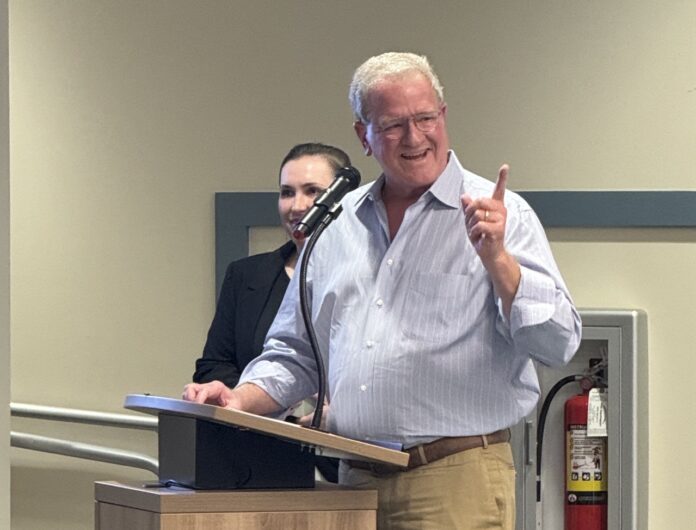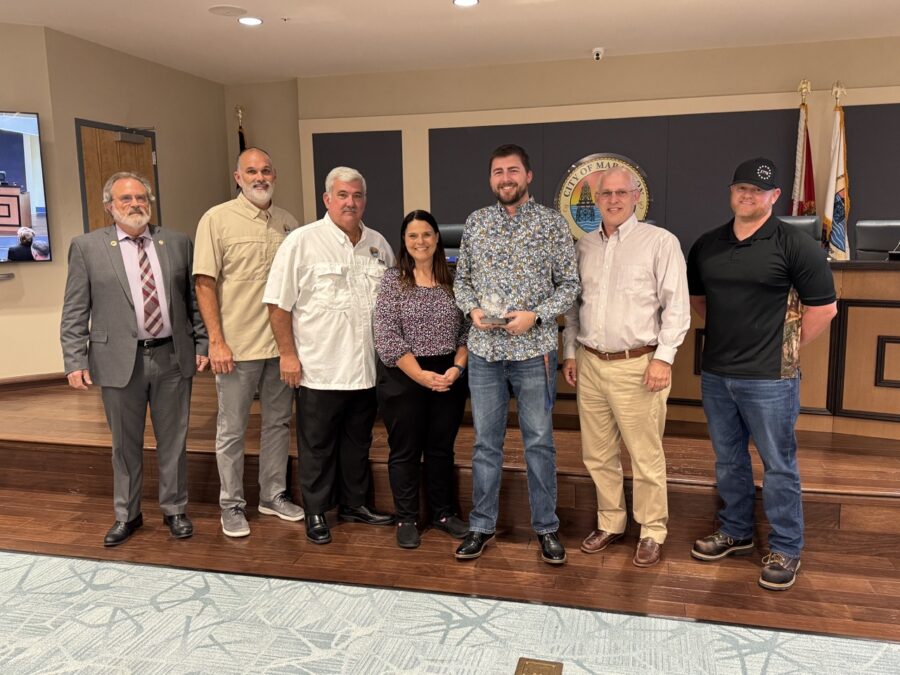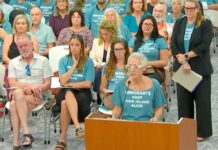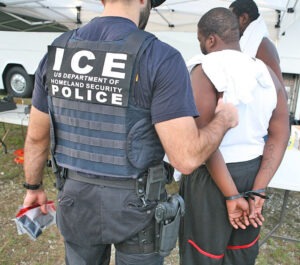
Overdevelopment concerns and resident demands for transparency surrounding the upcoming Florida Keys Resort at the Florida Keys Country Club property once again brought out a full house to the Marathon City Council’s March 12 session.
Heightened recent interest in the property began as a resident response to a reworked hotel and motel room redevelopment ordinance (2023-15). Though the provisions were absent from the version of the ordinance approved in Tuesday’s session, prior drafts contained language that would have specifically enabled development of larger multi-bedroom villa-style units on the country club property than elsewhere in the city due to its Parks and Recreation zoning.
Throughout the night, a room full of public commenters mostly voiced a mistrust of the resort’s intentions moving forward, with some demanding safeguards to ensure the promised restoration of an 18-hole golf course, left half-abandoned since Hurricane Irma.
The evening opened with an impassioned defense of the resort plans already in motion by Peter Rosasco. Rosasco said he owns 33% of Florida Keys Resort, LLC, the company behind the project, with the remaining 67% held by Jupiter-based development company Index Investment Group.
Rosasco cited a continued community commitment since acquiring the property from the Sombrero Country Club, Inc., which originally permitted the upcoming resort, in 2014. He said he “didn’t hesitate” to lease the area formerly used by the eastern (front) nine holes of the golf course for debris collection after Irma, and had continued to leave the course open and operational for use by the public, high school sports teams, nonprofits and numerous charity golf tournaments despite annual losses of $250,000.
In addition, filling and raising the property’s eastern end to the appropriate level for a resort and rebuilt golf course, the results of which have begun to take shape in recent months, cost upwards of $15 million, he said.
As stated in the property’s existing development agreement, in place since 2014, the upcoming resort will include a hotel in the site of the county club’s existing clubhouse along with 15 three-bedroom villas wrapping around the south shore of the property’s eastern half.
“We presently have 15 villas, and there’s been a lot of discussion because we’d like to build a little larger units if we can,” Rosasco said. “And if we can’t, we’re going to build (what’s already permitted).”
Councilman Kenny Matlock challenged Rosasco in a tense exchange, asking if the resort would commit to forgoing a future increase of villas through an amended development agreement or consider developing the parcel’s golf course before finishing the resort.
“No, I’m not,” Rosasco said. “But if you don’t approve (the changes), it won’t happen. … How can you ask someone to continue to subsidize something $250,000 or more a year without a revenue source to support it?”
Public commenters, while heavily applauding the country club’s support of community events, blasted the upkeep of the course’s western (back) nine holes, adding that they found it unlikely the resort would be able to build its desired amenities with the front nine holes in the space available.
Some asked for any form of guarantee that the golf course would be finished alongside the resort, which City Attorney Steve Williams said could be accomplished by withholding Certificates of Occupancy for the resort’s hotel and villas until the course was complete. The resort’s existing development agreement contains similar protections.
Others, including longtime Marathon resident Bettye Chaplin, called the course “a gift to the community,” referring to its low-priced sale from Marathon pioneer Stanley Switlik.
“When all of this transition took place with the sale to Index, we were told that the golf course would be a primary focus of preservation,” said one Marathon homeowner. “That good faith, I think, has been compromised. … These large private equity groups are here for one purpose, and they will consistently nibble away at this town only for profit.”
Local charter captain Dave Perry produced a prior landscaping rendering for the property that appeared to show additional villas and single-family residences set for development along the southern edge of the redeveloped property, an idea Rosasco said he had considered during the COVID-19 pandemic as market demands shifted from traditional hotels to standalone units shared by families.
Status quo for hotel/motel ordinance
The latest draft of Marathon’s hotel/motel redevelopment ordinance (2023-15), unanimously approved at its first public hearing, will largely preserve the status quo for redevelopment of single-bedroom hotel units as larger multi-bedroom units under the city’s code. Earlier drafts of the ordinance, which allowed redeveloped units to contain up to six bedrooms and removed a square footage restriction on those units, drew heavy criticism from Matlock and residents, who pointed out prior provisions they believed were intended to aid development only on the Florida Keys Country Club property.
Under the version approved Tuesday night, hotels and motels must provide on- or off-site employee housing living space in an amount equal to 25% – up from the previous 20% – of the approved floor area in guest units, as well as a lobby for guests to check in and out. Redeveloped hotel units may not exceed 1,500 total square feet with three bedrooms, two and a half bathrooms and one additional living area. One-bedroom units may develop as two-bedroom units in exchange for a 10% reduction in the overall number of units, or as three-bedroom units in exchange for a 20% reduction.

In Other News:
- The city will seek assistance from an external consultant to help council members accurately complete Florida’s controversial Form 6 financial disclosure. The highly-detailed form, previously required only for county, state and other higher-level elected officials, is now required for mayors and elected municipal leaders since the passage of Senate Bill 774 “Ethics Requirements for Public Officials” in the 2023 state Legislative session. The new form has prompted widespread resignations of elected officials throughout Florida, as well as a lawsuit backed by 26 cities against the Florida Commission on Ethics.
- Following concerns about the past performance of Brightview Landscaping, contracted by the city to provide landscaping and janitorial services for Marathon Community Park, Sombrero Beach and other restrooms throughout the city, the council directed staff to approach the company about a voluntary one-year renewal of its city contract, as opposed to the three-year extensions detailed in the original 2018 contract. The city will also consider drafting a request for proposal or bringing landscaping services in-house.
- The council unanimously approved resolution 2024-25, granting a conditional use permit for development of 12 residential units at 12640 Overseas Highway. The existing commercial building, formerly occupied by Iberia Bank, will be converted into four condominium units, along with construction of eight new single-family homes.
- Ordinance 2024-04, approved 4-1 at its first reading with Matlock dissenting, will add additional requirements to the city’s residential lighting standards. On top of existing standards for residential lighting in view of sea turtle nesting beaches, the new ordinance contains multiple provisions preventing light from residential buildings from causing glare on roads, driveways, bike paths and adjacent properties. Under the ordinance, which will be reviewed again next month, nonconforming fixtures must be replaced within two years.
- Resolution 2024-31, approved on consent, authorized up to $143,120 in expenses with Weiler Engineering as the firm assists the city with engineering and other required documentation for grant funding as the Marathon prepares to install a deep wastewater injection well. Required in Marathon’s highly-publicized settlement with Friends of the Lower Keys (FOLKs) in a lawsuit over the city’s use of shallow injection wells to dispose of its wastewater effluent, the project will direct effluent from all of Marathon’s wastewater plants to a single deep injection well. Multiple public commenters addressed the council in favor of constructing the project on Crawl Key instead of another proposed site on Coco Plum Beach’s Avenue I.
- Resolution 2024-30, also approved on consent, permits the use of $500,000 in grant funding to help complete the upcoming stormwater injection well project on Sombrero Boulevard.






















